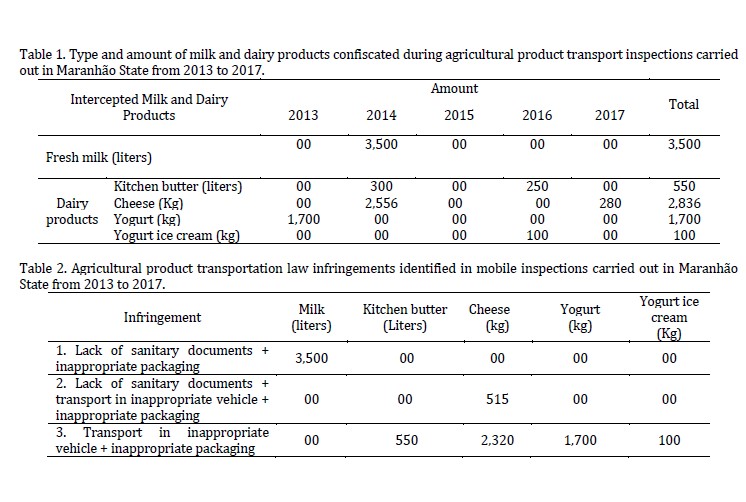Milk and dairy product interceptions due to agricultural product transport inspections carried out in Maranhão State
DOI:
https://doi.org/10.21708/avb.2019.13.4.8466Resumo
The aim of the current study is to perform a systematic investigation about the interception of milk and dairy products during agricultural product transport inspections carried out in Maranhão State. A retrospective study was conducted over a five-year period; it recorded 90 mobile monitoring events that together intercepted 3,500 liters of milk, 500 liters of kitchen butter, 2,836 kg of cheese, 1,700 kg of yogurt and 100 kg of yogurt ice cream. Most of these products (n = 13/16; 75%) were intercepted during their transportation from one city to another. The most recurring law violations regarded products transported in inappropriate vehicles (e.g., in the trunk of passenger buses and minibuses and in trucks used for animal-feed transportation) and in inappropriate packages such as garbage bags, rice-packing bags, cardboard boxes and non-reusable containers for micronutrients. All law violations recorded during the interceptions resulted in product confiscation, in fine issuing and, in specific cases, in product destruction through povidone iodine application. Fines issued due to irregular transportation of animal products during the assessed period accounted for R$ 11,688.00. It was possible concluding that the transportation of milk and dairy products in Maranhão State is not in compliance with the Brazilian legislation (ordinances, decrees), a fact that may endanger public health in the investigated State, as well as in other Brazilian cities that trade these products. It is essential intensifying these inspections to help suppressing the illegal trade of milk and dairy products.
Downloads

Downloads
Publicado
Edição
Seção
Licença
Autores que publicam na Acta Veterinaria Brasilica concordam com os seguintes termos: a) Autores mantém os direitos autorais e concedem à revista o direito de primeira publicação, com o trabalho simultaneamente licenciado sob a Licença Creative Commons Attribution que permite o compartilhamento do trabalho com reconhecimento da autoria e publicação inicial nesta revista. b) Autores têm autorização para assumir contratos adicionais separadamente, para distribuição não-exclusiva da versão do trabalho publicada nesta revista (ex.: publicar em repositório institucional ou como capítulo de livro), com reconhecimento de autoria e publicação inicial nesta revista. c) Autores têm permissão e são estimulados a publicar e distribuir seu trabalho online (ex.: em repositórios institucionais ou na sua página pessoal) a qualquer ponto antes ou durante o processo editorial, já que isso pode gerar alterações produtivas, bem como aumentar o impacto e a citação do trabalho publicado (Veja O Efeito do Acesso Livre).


 Esta obra está licenciada com uma Licença
Esta obra está licenciada com uma Licença 